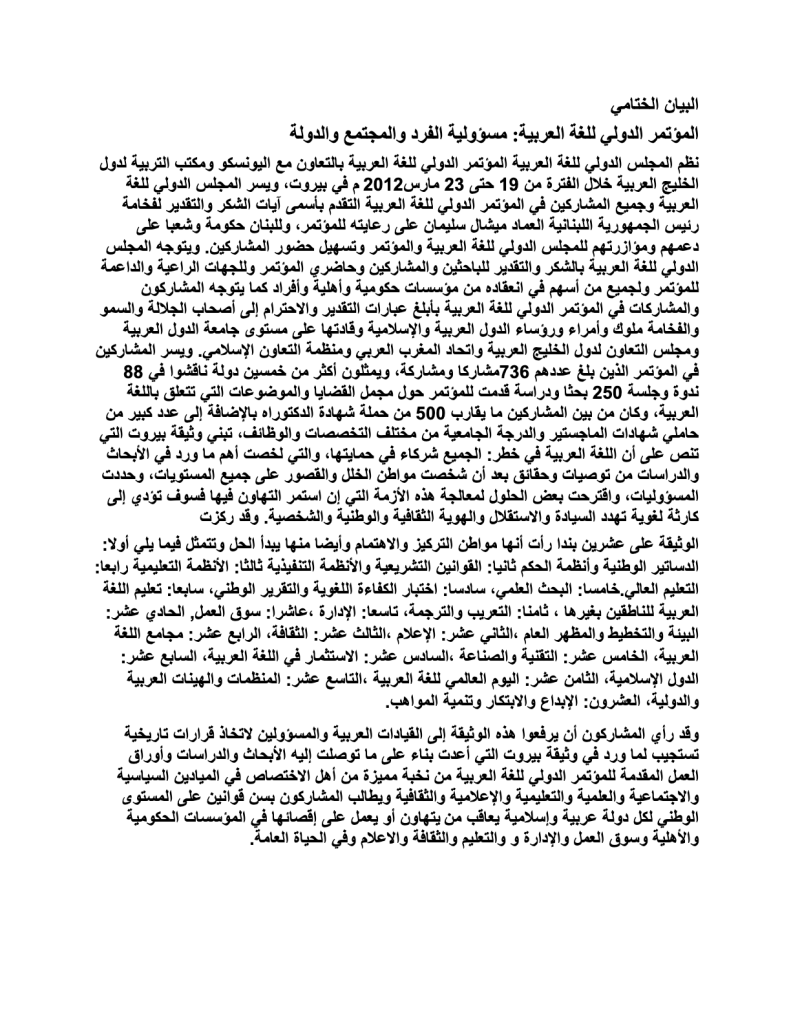
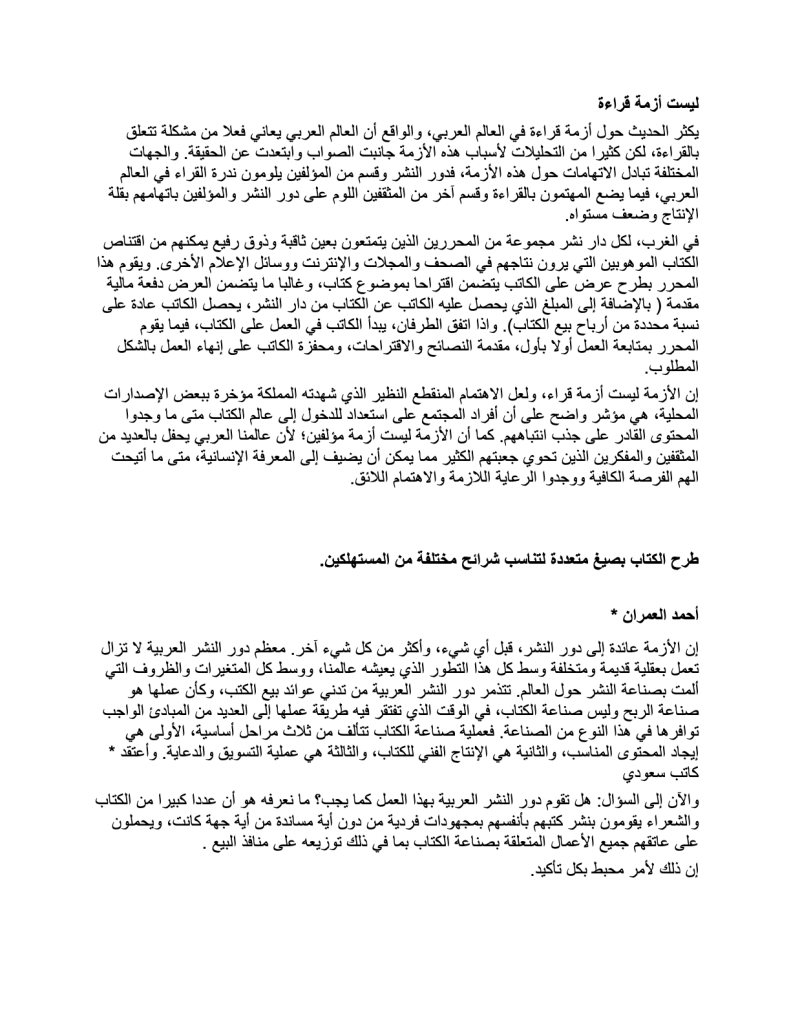
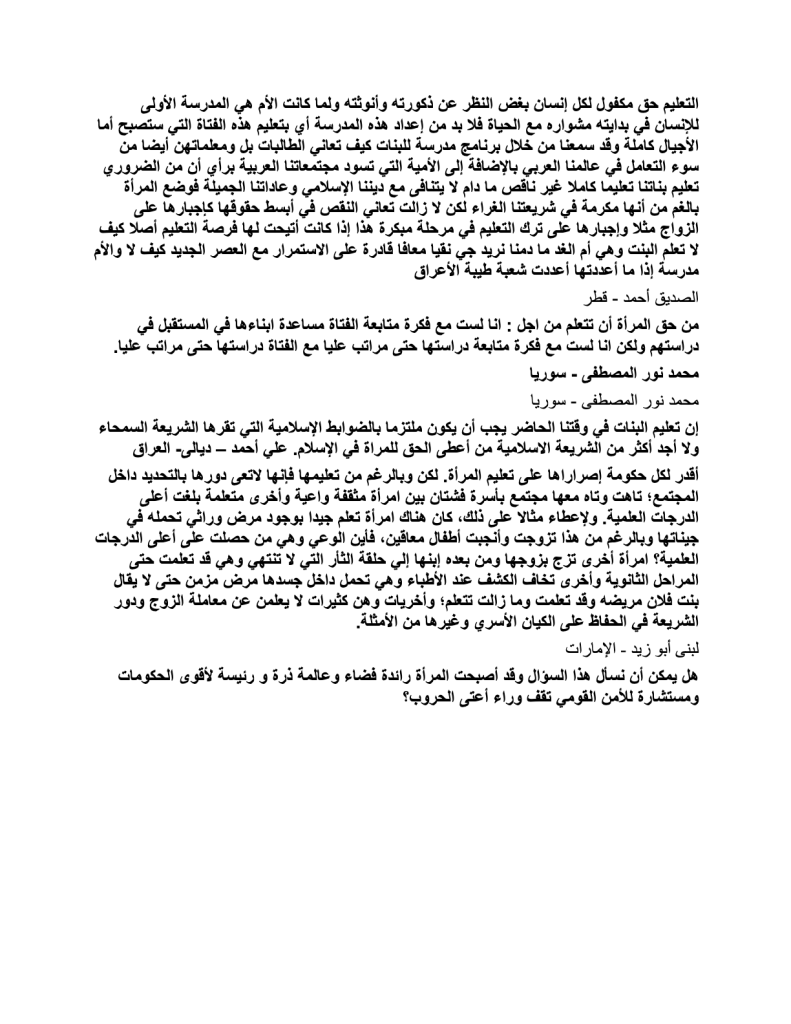
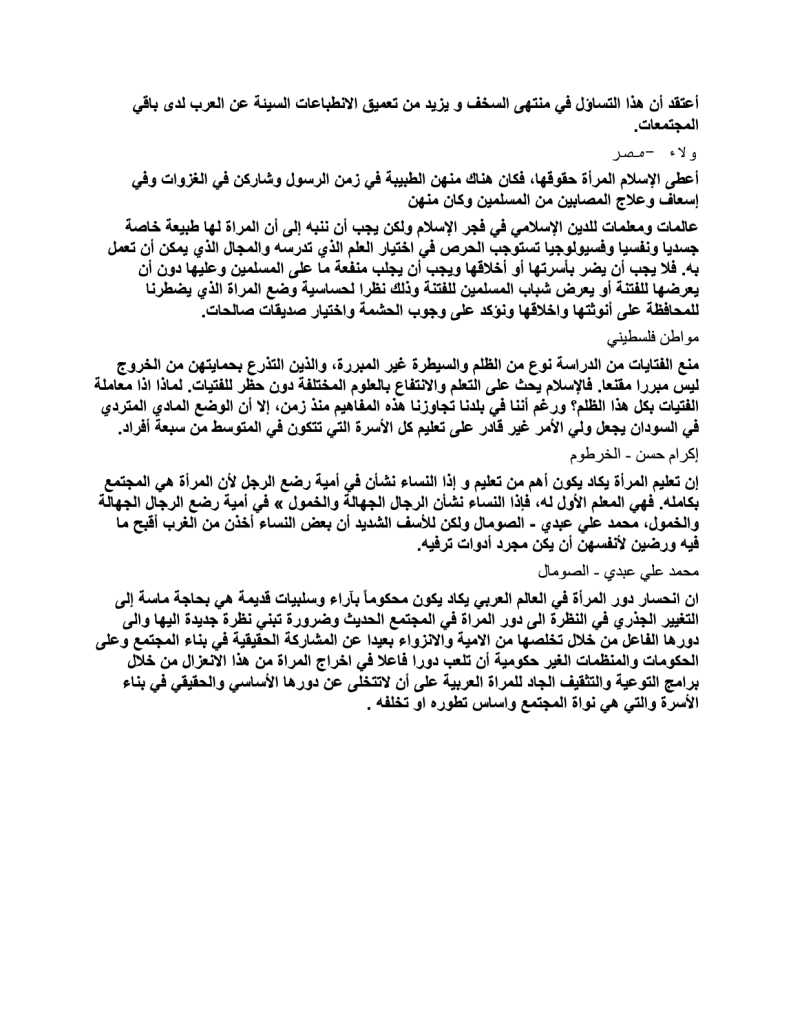
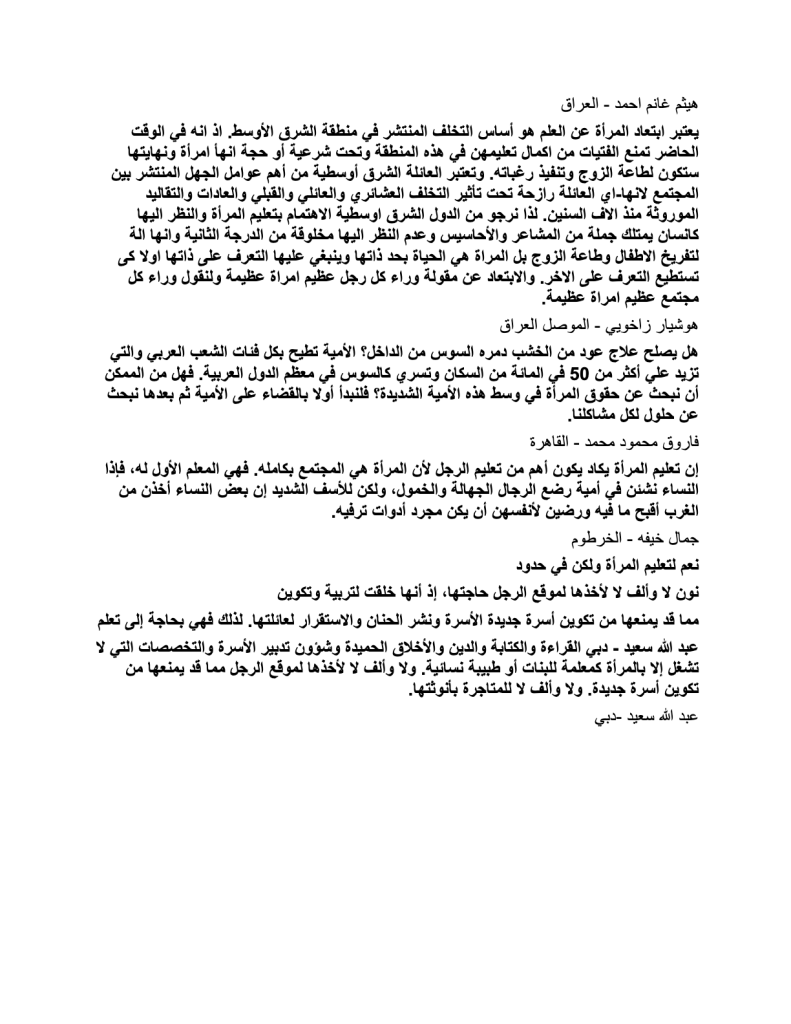
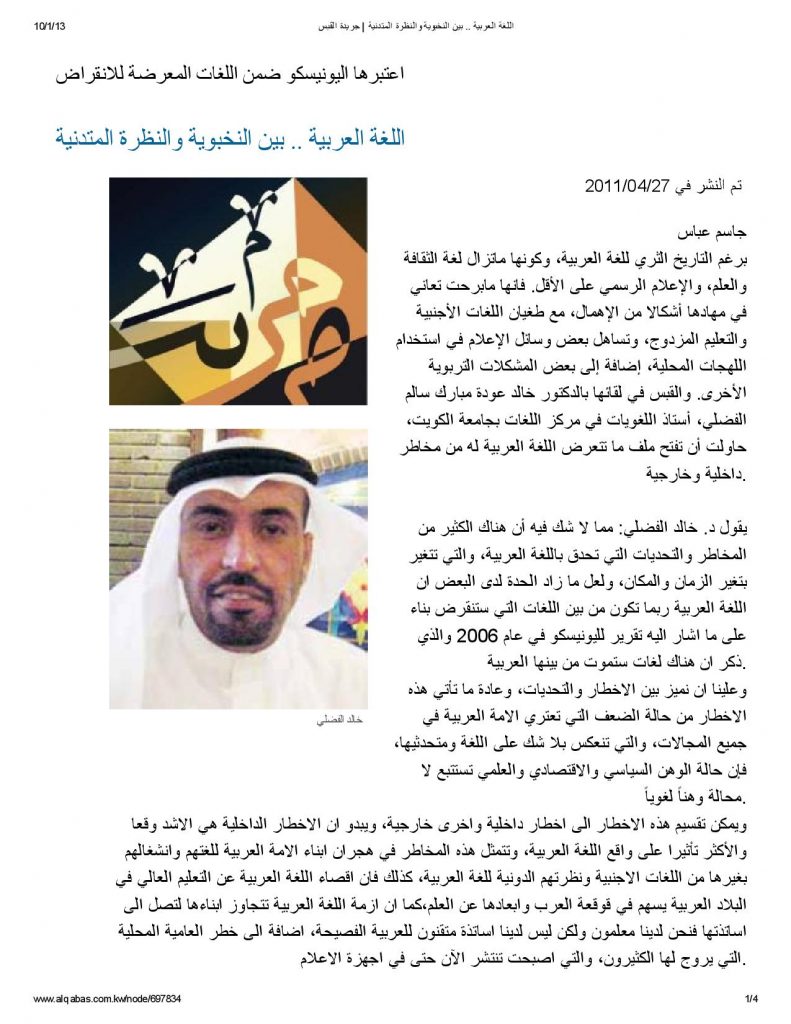
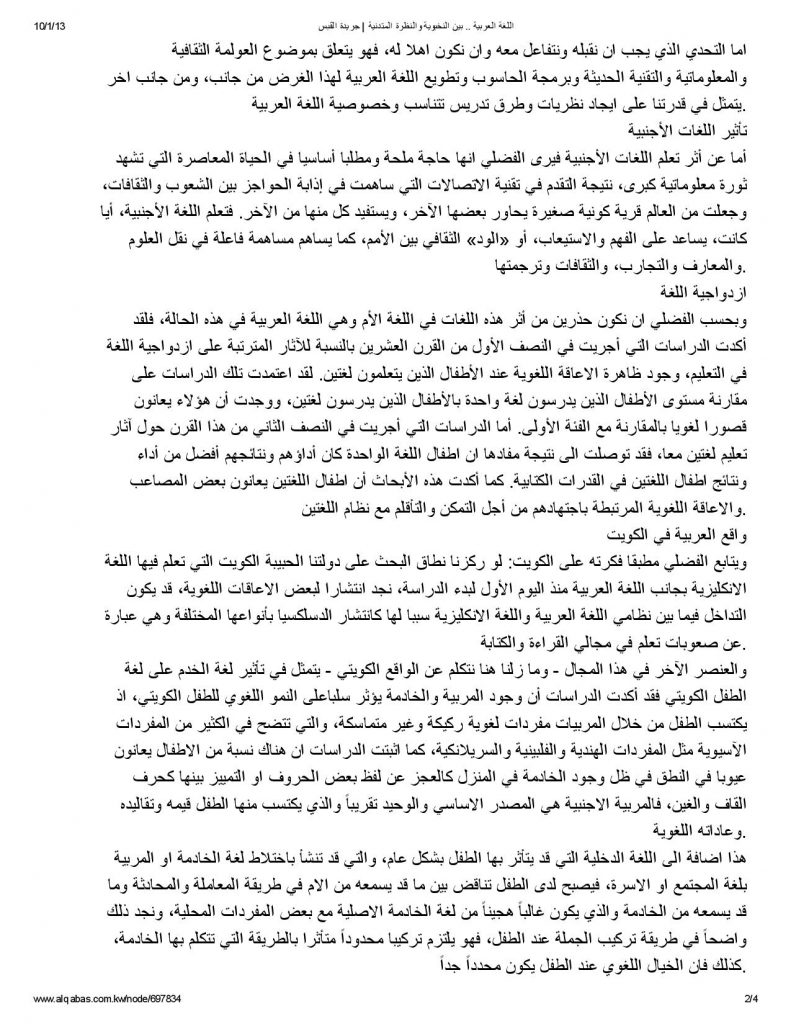
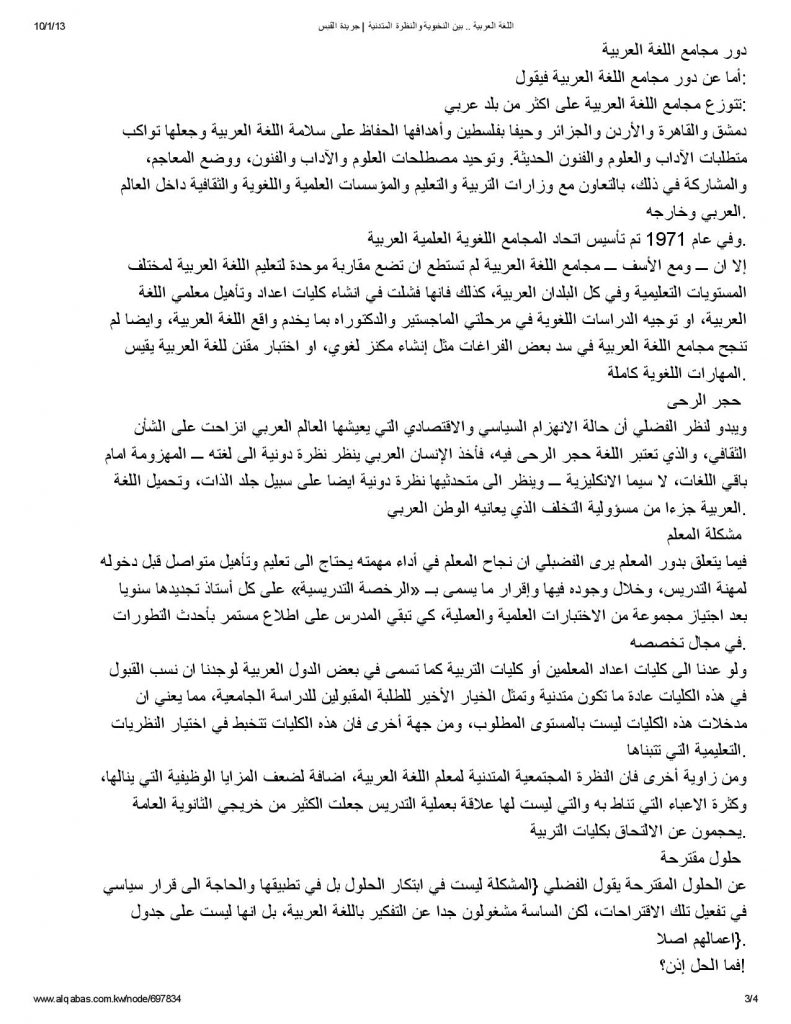
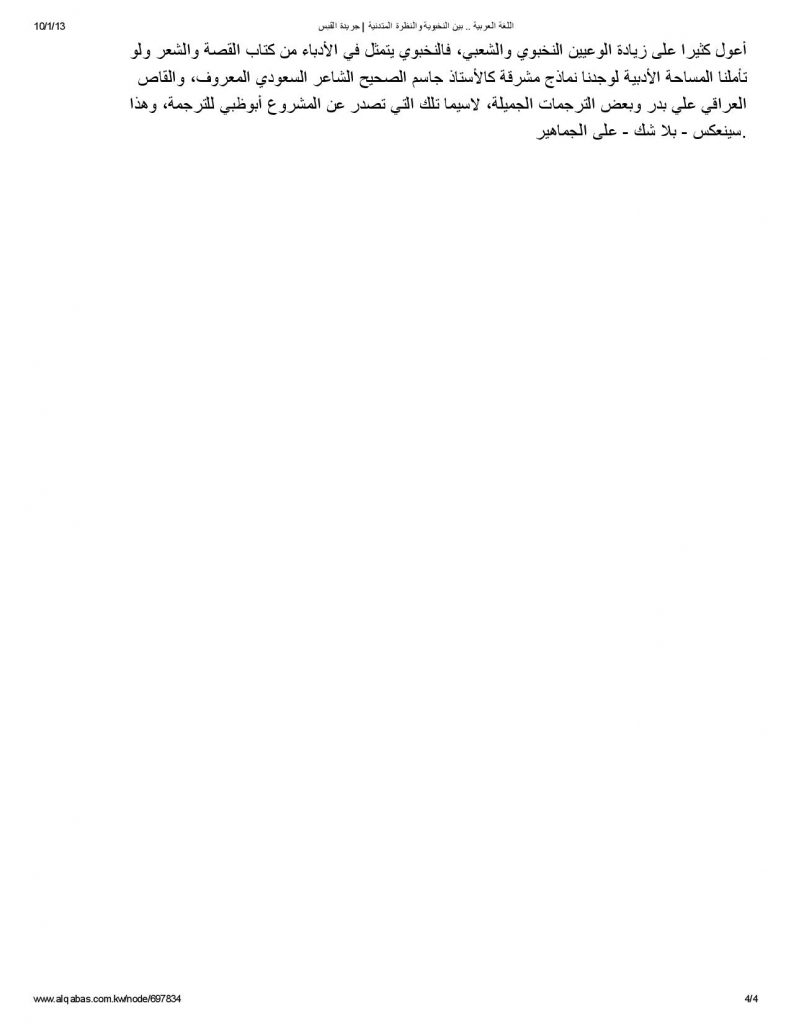
GRAMMAR NOTE الضمير العائد‘The resumptive/referential pronoun’
In discussing relative clauses we referred to two types. One modified a definite head noun and is introduced by the relative pronoun الذي , which as we know agrees with it in gender and number and is a definite relative clause referred to in Arabic as اسم موصول وصلته. The other modified an indefinite noun and occurred immediately after it, referred to in Arabic as جملة وصفية . Both clauses are internally identical in their inner construction and contain a pronoun that refers to the head noun, called resumptive or referential pronouns, known in Arabic as العائد ; i.e. they are complete sentences (verbal or nominal/equational) linked to their head noun by العائد that agrees with it in gender, number, and case .
العائد occurs in a variety of places in the clause and its function depends entirely on its position in that clause:
- It occurs as subject in a verb-initial clause and is to be found within the verb itself . Try to locate it in the following sentences.
رئيس يدعى الشيخ a leader who is called “The Sheik”
كانوا وثنيين يعبدون … They were pagans who worshiped …
بعث فيهم شعوراً جديداً يقوم على مبادئ It evoked in them a new spirit that rested on principles.
- It occurs as object of a verb; note that this pronoun object is not translated into English:
من الأحداث التي عرفها العرب among the events that the Arabs experienced
جريدة الاهرام التي أنشأها صحافيّان the Ahram newspaper which two journalists established
With a doubly transitive verb having one object as a pronoun, العائد is attached to the word إيّا
تلك مساعدة وهبته إيّاها االحكومة. That is assistance which the government gave him
3. It occurs as subject of an equational sentence.
وصف المرض الذي هو عدوّنا وعدوّكم He described the malady which is our enemy and yours.
برز عملان رئيسيان هما قاموسه … و … Two works stand out which are his dictionary and …
ذكر اسم امرأة ساعدته هي اخته. He mentioned the name of a woman who helped him that is his sister.
Note in this last sentence the presence of two relative clauses where العائد in both cases is subject .
- It occurs as object of a preposition. Here it is normally rendered in English by the preposition and a relative pronoun:
كتاتيب يُعلَّم فيها القرآن kuttabs in which the Qur’an was taught
المدارس التي أُنشئ عدد منها the schools, a number of which were established
صوتاً فيه قوّة الرحمة a voice in which there was the power of mercy
سوق تدعى عكاظ يبيعون فيها a market known as :Ukaz” in which they sold …
ألقى نحوي نظرة خاطفة فيها الحبّ والحنان He gave me a quick look in which there was love and tenderness.
5. It occurs as the last term of an اضافة. Here it is usually rendered as “whose” in English:
رئيس يخضع … افراد القبيلة لإدارته a leader to whose authority the members of the tribe submitted
قُدّمت اقتراحات … هدفها تيسير الكتابة Recommendations were presented whose goals were to facilitate writing. .
المنظمة التي زرنا فروعها the organization whose branches we visited
Note the difference between the following two constructions:
المناسبات التي تتطلّب استعمالَـَها the occasions that require its (الفصحى ) use (that it be used)
المناسبات التي يتطلـّب استعمالـُها الفصحى the occasions whose use requires Standard Arabic.
- العائد also occurs in these same positions in clauses (though with less frequency) with the indefinite pronouns ما و مَن (See Lesson 2 Grammar Note 2). It occurs in the clause after فـ in an امّا … فـ construction (See Lesson 3 Grammar Note 4) and in the comment of a topic-comment sentence , though in these two cases the referent is called رابط . It also occurs in
and is attached to the subject in aنعت سببي and is attached to the noun that follows the participle, which is invariably is its subject (See Lesson 7 Grammar Note 1 ).
- There are cases where العائد is not used and is dropped:
- when it is subject and the predicate is a prepositional phrase:
شخّص المرض الذي(هو) فينا وحولنا He diagnosed the disease which is in us and around us.
الأصدقاء والمعارف الذين (هم) بجانبنا كثيرون Our friends and acquaintances who are at our side are many.
خذ كل الأشياء التي (هي) على الطاولة Take all the things that are on the table.
- when it is the object of a preposition in a phrase whose antecedent is a time expression:
أُلاحظ ذلك في اوقات تكون ( فيها ) الاوضاع صعبة . I notice that at times during which circumstances are hard.
هو بانتظار اللحظة التي سيعمل (فيها) معها. He is awaiting the moment on which he will work with her.
c. frequently with the indefinite pronouns ‘that which’ and ‘he who’
لم اكن عل علم بمَن (هم) في الصف. I was not in the know of who was in class.
هذا ما كنت اتوقّع( ه ). That is what I expected.
Lesson 8. GRAMMAR NOTE 8 العائد ‘The resumptive pronoun’
This pronoun appears mostly in جملة وصفية/صلة اسم الموصول indefinite/definite relative clauses. It occurs in a variety of places in the clause as:
1. subject marker in a sentence headed by verb .
رئيس يدعى الشيخ a head who is called Sheik
كانوا وثنيين يعبدون … they were pagans who worshiped …
بعث فيهم شعوراً جديداً يقوم على مبادئ it evoked in them a new spirit that rested on principles
2. object of a verb:
من الأحداث التي عرفها العرب among the events the Arabs experienced
جريدة الاهرام التي أنشأها صحافيّان the Ahram newspaper which two journalists established
3. subject of an equational sentence.
شخـّص الداء الذي هو عدوّنا وعدوّكم
برز عملان رئيسيان هما قاموسه … و … Two works stand out which are his dictionary and …
It is dropped in this case, if the predicate is a prepositional phrase:
شخّص المرض الذي (هو) فينا وحولنا He diagnosed the disease which is in us and around us.
الأصدقاء والمعارف الذين (هم) بجانبنا كثيرون The friends who are by our side are many.
خذ كل الأشياء التي (هي) على الطاولة Take the things which are on the table.
4. object of a preposition.
Here it is normally rendered by preposition + relative pronoun in English, if the English construction requires it:
كتاتيب يُعلَّم فيها القرآن “kuttabs” in which the Qur’an was taught
المدارس التي أُنشئ عدد منها the schools, a number of which were established
صوتاً فيه قوّة الرحمة a voice in which there was the power of mercy
سوق تدعى عكاظ يبيعون فيها … ( a market known as ‘UkaZ’ in which thy sold …
Note that in the following sentence, English does not require a preposition:
السيارة التي وعدني بها the car which he promised me
This is not a function of relative clauses or resumptine pronouns but of two-word verbal phrases. If there is no prep. the rule does not apply here.
ألقى نحوي نظرة خاطفة فيها الحبّ والحنان He gave me a quick look in which there was love and tenderness.
5. the last term of an اضافة .
Here it is usually rendered as ‘whose’ in English:
رئيس يخضع … افراد القبيلة لإدارته (2, 2:4) a leader to whose authority every member submitted
قدّمتْ اقتراحات … هدفها تيسير الكتابة (3, 5:3) it presented recommendation whose goals were to facilitate writing
المنظمة التي زرنا فروعها the organization whose branches we visited
Note the difference between the following two constructions:
المناسبات التي تتطلّب استعمالَََـَها… the occasions that require its (الفصحى ) use
المناسبات التي يتطلـّب استعمالـُها الفصحى the occasions whose use requires الفصحى
As you will remember this pronoun also occurs in these same positions in a topic-comment sentence and is attached to the subject in a نعت سببي .
It is important that you apply these rules when you compose in Arabic.
GRAMMAR NOTE 2 . الـ ‘The Particle al-‘
This particle has the following three uses in Arabic:
1. التعريف ال ‘the definite article’
The basic meaning of the definite article in Arabic, as in English, is specified referent: the noun so defined has either been mentioned previously or is a specific item in the mind of the speaker and can be identified by the hearer, where it is the ‘article of the expected’ as in:
ماذا قال الرئيس في خطابه What did the president say in his speech?
ذهبت الى البيت وفتحت النوافذ واستمعت الى الراديو ثمّ استخدمت الهاتف.
I went home, opened the windows, listened to the radio, and then used the phone.
It is also used by convention with many groups of nouns, contrary to English usage, such as:
a. Kinship terms when talking about close relations, instead of using a personal pronoun, but whether it refers to the speaker’s or hearer’s relations would depend on the context:
إهدِ سلامي للوالد Give my greetings to (your) father.
سأذهب لزيارة الجَدّة عند عودتي. I’ll visit (my) grand mother upon my return.
زواجي منها لم يعجب الأسرة. My marriage to her displeased the (=my/her) family.
استقبله كلّ الأقارب والجيران. All (his) relatives and neighbors welcomed him.
b. Time and times, with days of the week, time of day, part of a day, seasons, routine daily activities:
يوم الخميس في الساعة الثانية والنصف on Thursday at 3:30
c. Geographical names, It is used in some place names and geographical features:
اليابان، العراق، اليمن، القدس، الرياض، الفرات، الصحارى
d. Adverbial expressions of place and time:
الآنَ، اليومَ، الاسبوع القادم، now, today, next week
الى الأمام، الى الوراء، في الداخل والخارج up front, to your back, inside, outside
e. With titles and names, except in direct address
الملك عبدالله King Abdallah الدكتورة نوال السعداوي Dr. Nawal Al-Saadaawi
الرئيس اوباما President Obama الشيخ محمد عبده Shaikh Muhammad Abdo
البابا شنودة Pope Shunudah الاستاذ نهاد الموسى Prof. Nihad Al-Musa
But: كيف حالك، يا استاذ أحمد How are you, Professor Ahmad?
f. Expressions of quantity with adjectives expressing quantity or amount , such as كثير، عديد، قليل، , followed by مِنْ , which mean many/much, various, a few,
لا اعرف الكثير من امور السياسة. I don’t know much about things political.
واجه العديد من المشاكل. He encountered a lot of problems.
يعرفون العديدَ من الأمثال العربية. They know many Arabic proverbs.
2. ال الجنسية او ال التي للجنس ‘Generic ‘the’ in Arabic’
- Note the following sentences in the Basic Text of Lesson 7:
ففيها الافتتاحيّاتُ التي تناقش … ، وفيها الأنباء العالمية والمحلّيّة، وفيها ايضا التعليقات …
In it there are leading articles which discuss.. , world and local news, and also commentaries.
We have here verbless sentences whose predicates are ‘existential’ and placed first, and we are accustomed to the subject of such sentences being indefinite as in في المكتب طاولة كبيرة. Here, however, the subject has ال. On closer examination, it is clear that the particle is not the definite article, it is the generic article, known in Arabic as ال الجنسية او ال التي للجنس , which indicates the general or ‘generic’ class (جِنس genus, class) of nouns, singular or plural, such as ‘news’, commentaries’, ‘editorials’, etc. , a class for which English does not use the article
.Another case where the particle is used in this way occurs in this lesson in the third paragraph:
غير ان هناك بعض المدارس والمعاهد ِ الخاصّة الأهْليّة
but there are privately owned schools and institutions
This could be ambiguous. If the context had المدارس refer to previously mentioned schools as in هذه المدارس or مدارسها , the construction with هناك could not be used. In this lesson, however, the article is generic and the sentence means ‘there are some schools’; with هذه المدارس or مدارسها , the meaning is ‘some of these schools’ and ‘some of its schools’.
Here is another example (taken from the last paragraph of lesson 12):
… فـَعـُقـِدت المؤتمرات ووضعت الخطط المشتركة …
Conferences were held, and shared plans were laid, …
English generic nouns may be singular definite, like ‘the lion’ in:
The lion is the king of the beasts. الأسد ملك الحيوانات.
or indefinite plural as in:
Libraries are (The library is) the heart of the university
where no specific library or university is referred to, but all libraries in general
b. Several other examples of ال الجنسية have occurred in this book (see for example lessons 1 and 2, where we have items such as اللحم، البصل ، الصناعة، الشِعر etc.. Once again, it is to be noted that English does not use the article in these cases. In English the singular concrete noun is usually defined by the definite article, whereas plural concrete nouns are indefinite, as in “Today books are available in incredibly many forms.
- In Arabic ال الجنسية is used with nouns referring to institutions, customs, routine activities and predictable activities and objects It is thus used with these items:
abstract nouns: القراءة والكتابة ‘reading and writing’, التعليم ‘education’ ,
الديموقراطية ‘democracy’ , الحب ‘love’ , التقدّم ‘progress’ الغضب ‘anger’
food items: الشاي ‘tea’, الحليب (اللبن) ‘milk’, القهوة ‘coffee’
academic subjects: التاريخ ‘history’ الجغرافيا، ‘geography’, الهندسة ‘engenering’
names of languages: (Chinese) العربية، الفرنسية، الصينية
It may be useful to compare the use of the article in the two languages in the following:
في المدرسة in/at school
بعد العشاء after supper من الشروق الى الغروب from sunrise to sunset
في الربيع in spring الغداء في الساعة الثانية والنصف Dinner is at 1:30.
يتناولون ثلاث وجبات: الفطور والغداء العشاء They take three meals: breakfast, dinner and supper.
- Another case where the article is used in this way occurs in this lesson 8 in the third paragraph:
غير ان هناك المدارس والمعاهد ِ الخاصّة الأهْليّة
but there are privately owned schools and institutions
This could be ambiguous. If the context had المدارس refer to previously mentioned school as in هذه المدارس or مدارسها , the construction with هناك could not be used. In this lesson, however, the article is generic and the sentence means ‘there are some schools’; with هذه المدارس or مدارسها , the meaning is ‘some of these schools’ and ‘some of its schools’.
These nuances are important to distinguish and ought to be in full control of students seeking the “Superior” level of proficiency, especially when it comes to productive skills.
3. الاسم الموصول الـ ‘The Relative Pronoun “al-” ’
We encounter this usage mostly with participles and adjectives, used with verbal force singly, in an ‘ اضافة غير حقيقيّة ‘adjectival idafa’, and in نعت سببيّ (for these see notes in the previous lesson). Here are examples
.
كان الطلاب المتفوّقون الراغبون في التخصّص في الفِقـْه … ينتقلون …
Advanced students who wished to specialize in Fiqh transferred to …
مُؤيـّدوه القائمون به والعاملون على إنجاحه
those who support it and are taking charge of it and those who are working to make it successful
الكتّاب الواسعي الشهرة well known writers (“whose reputation is widespread”)
القواعد المعمول بها the rules in force (“that are worked with’)
الاحزاب السياسية المسموح بها قانونيّا the parties that are officially recognized
المجلاّت المتميّزة المحتوى magazines that have specialized content
You know of course that some of these adjectives and participles have come to be used strictly as nouns; in this case the “al-” is the definite article. Some are used with verbal force. Still others can be used with both meanings and can be treated as either. Here are other examples.
العارفون منكم يخبرون الجاهلين Those who know should inform those who don’t.
الصالح والطالح The good and the bad.
المعروف عنه أنه … What is known about him is that …
الغريب أننا مكثنا في مكاننا What is strange is that we stayed put.
من الصعب ان نفهم هذه السياسة It is difficult to understand that policy.
من الجدير بالذكر… It is worth mentioning …
الأحسن أنْ … It is best to … (“the best to do is …”)
الأنكى من كلّ ذلك أنه … What is worse (lit. the worst thing of all), is that he …
GRAMMAR NOTE 3 Coordinated Noun Phrase as مضاف معطوف
Let us examine the expression تشجيع وتيسير التعليم .
According to the strict rule, the مضاف in an إضافة should consist of one single noun only, not a coordinated noun phrase of two or more items , and hence the example should read تشجيع التعليم وتيسيره . This rule still applies; however the rendering with the coordinated noun phrase as مضاف is widely used today and seems to be gaining ground.
Lexical Note 1 ذو ‘possessor, owner (of)’
Observe the following examples and adaptations of items that occur in the Basic Text:
هذا المعهد ذو طابعٍ دينيٍ This institution has a religious character.
طابعٍ دينيٍ هناك مدارسُ ذاتُ There are schools that have a religious character.
وخاصّةً من ذوي الدخلِ المحدودِ …especially among those with limited income
لطالباتِ ذواتِ المؤهّلاتِ الممتازةِ to women students who have excellent qualifications
للوصول الى مركزَ ذي اهمّيّةٍ كبيرةٍ in order to reach a position of great importance
للوصول الى مراكزَ ذاتِ اهمّيّةٍ كبيرةٍ in order to reach positions of great importance
- These illustrations show the masculine and feminine singular forms of the noun ذو possessor (of) in the nominative, then their masculine and feminine plural forms in the second two citations, and in the next to last phrase its masculine singular genitive, and in the last phrase the feminine singular form ; the full declension is given below.
- ذو always occurs as a مُضاف to (“in a genitive construct with”) a noun denoting a quality which it attributes to the modified noun as a part of its identity or character, as in the examples above, or to a physical object literally as its ownership. or of things when its مضاف اليه is an item that one can own, such as money in ’ذو مال كثير‘ , a shirt ’ذو قميص أزرق‘, eyes ’ذو عينين زرقاوين‘.
- ذو is usually an attributive modifier in apposition with the noun but may also function independently as in illustrations 1 (predicate) and 3 (object of preposition) above. As an attributive modifier of a noun, ذو agrees with that noun in number, gender and case; the noun that follows it agrees with the noun it modifies in definiteness. As an independent substantive it means “the one(s) who/that which” and agrees with the noun it refers to in number and gender but takes the case required by its function in the clause. Note the translations in the illustrations above, which include a verb (“has”), a relative pronoun and a verb (“that have”, “who have”), and a preposition (“with”, “of”).
Declension of ذو
| Masculine | Feminine | |||||
| Singular | Dual | Plural | Singular | Dual | Plural | |
| Nominative مرفوع | ذو | ذَوا | ذَوُو\أُولو (’uuluu) | ذاتُ | ذَواتا | ذَواتُ |
| Genitive مجرور | ذي | ذَوَيْ | ذوِي | ذاتِ | ذَواتَيْ | ذَواتِ |
| Accusative منصوب | ذا | ذاتَ |
- The feminine singular form has become an independent noun (substantive) in its own
right with its own plural, ذاتٌ – ذَواتٌ , and has the meanings “person, personality; the same, the selfsame; -self” (see the Arabic-Arabic Dictionaries المنجد والمعجم العربي الأساسي or Wehr’s Arabic-English Dictionary). These dictionaries provide under this entry a long list of contexts and meanings, as well as other words derived from it, which makes an interesting study in word derivation.
5. الأسماء الخمسة /“The Five Nouns”
The noun ذو is a member of a group of five nouns that consist of two rather than three letters and, like ذو, are declined with و, ي, and ا representing the three cases. They are ذو, ابٌ father, أخٌ brother, فمٌmouth and حمٌ father-in-law. Thus for ابٌ we have ابوin الرَفْع the nominative case, ابيinالجَرّ the genitive and اباin النَصْب the accusative. The form فم is replaced by the form فو when it is a مضاف (the first term of an idafa, “in construct state”): فوهُ his mouth, في فيهِ in his mouth. The noun حَمٌ (plural أحْماء) as a مضاف (“in construct”) adds the long vowels for the case endings to the two-letter base: حمو، حمي، حما as in حضروا مع حميك They came with your father-in-law.
6. “ذو / ذات” تعبيرات شائعة ب
a. Some well known figures and names with ذو :
المعروف (Macedonia) ذو القـَرْنـَيـْن وهو لقب الاسكندرالاكبر، القائد المقدوني
ذو النون هو ا لنبيّ “يونُس” المذكور في القرآن واسمه في الكتاب المقدّس “يونان”
ذو القـِعـْدة وذو الحِجّة هما شهران من السنة الهجريّة والثاني هو شهر الحَجّ ويسبقه الأول
b. Some expressions with forms of ذو :
انسان ذو بال = انسان ذو شأن = انسان مهم
ذو فيه = كلامه
قريب/أقرِباء ذو/ ذوو قُربى =
ذووه = اقرباؤه
ذوو الشأن = من لهم نفوذ كبير
(اكثر) من ذي قـَبـْل= (اكثر) من ايّ وقتٍ مضى
3. Some expressions with the noun ذات :
الذات = النفس ‘self’
حبّ الذات = الانانية
الاعتماد على الذات ‘self reliance’
الثقة بالذات ‘self confidence’
ذات الشيء/المدير/الحكاية = الشيء ذاته/ المدير ذاته/ الحكاية ذاتها = الشيء/المدير نفسه/الحكاية نفسها
ذات البـَيـْن = ما بين افراد من خلاف او صداقة
في حدّ ذاته ‘in itself’
ذاتَ يوم/ليلةٍ/مرّةٍ = في ذاتِ يومٍ/ليلةٍ/مرّةٍ = في يومٍ/ليلةٍ/مرّةٍ
ذات اليـَمين وذات الشمال = جهة اليـَمين وجهة الشمال
LEXICAL NOTE 2.
رَغْمَ ‘in spite of, despite, although, nonetheless, even though’
رَغْمَ has several variants with the same meaning:
من ، برَغْمِ، بالرَغْمِ من/عن، رَغْـمَ ، رَغْما ً عن على رَغْمِ ،على الرَغْم.
They can be followed by a noun in the genetive or مصدر of both kinds صريح in the genitive or مؤوّل.
رفض الموضوع رغمَ كلِّ حسناته. He rejected the matter despite all its merits.
اتّخذوا العربية لغةً رغم أنهم ظلّوا على دينهم. They adopted Arabic as their language, though they kept their religion.
لم تحصل على منحة رغم تفوّقها. She did not get any grants in spite of her superior performance.
سار الناس في الشوارع رغم الغوغاء والفوضى People walked the streets despite the din and the anarchy.
الفكر عندنا لم يضف جديداً رغم النهضة Our thinking brought nothing new in spite of the renaissance.
تُشَكِّلُ بعض الدول كروسيا مثلاً قومية واحدة بالرغم من اختلاف الأديان فيها كما ان سويسرا تشكل قومية واحدة ايضا بالرغم من اختلاف اللغات فيها.
Some countries, like Russia for example, have a national entity, despite religious diversity; so does Switzerland despite language diversity in it
They follow the main clause, as in the examples above, or they may precede it, in which case, the main clause is introduced by إلا ّ أنّ، فـإنّ ، غيرَ أنّ ، او فـَ :
فبالرغم من تفوّقها في دراستها الا انها/فإتها لم تحصل على منحة
In spite of her superior performance, she was not given a grant.
وعلى الرغم من ان طه حسين فقد بصره في طفولته، غير أنّه استطاع ان يواصل دراسته في كُتّاب القرية والأزهر والجامعة المصرية و السّوربون
Though T. H. lost his eyesight in his childhood, yet he managed to pursue his studies in
the village school, in Al-Azhar, in The Egyptian University and in the Sorbonne.
In addition, the construction can be used parenthetically within the main clause:
من الجدير بالذكر انَهم بالرغم من هذا كلّه قد حافظوا على كيانهم.
It is worth mentioning that, in spite of all of that, they maintained their identity.
كانت ولا تزال رغم صِغَر سنّها رئيسة تلك الشركة.
She was and still is, despite your young age, the head of that company.
Here are a few common expressions and an idiom:
فعلت ذلك رغمًا عنّي. I did that against my will.
على الرغم منه without wanting it.
لم يفعل ذلك الّا رغماً. He does that only with great reluctance.
فعلتْ ذلك رغمًا عن أْنفي She did that against my will or in defiance of me (lit. against my nose).
Other adversatives or concessives include : 1. غير أنّ and أنّ إلاّ على أنّ and بَيْدَ أنّ ‘however, but’ مع أن ‘in spite of the fact that’ سِوى أنّ ‘but, except that’ which head an independent statement that follows the statement they contrast:
يجب أنْ نكون معطائين. بيْد أنّ العطاء له حدود We should be generous. However, generosity has its limits.
وطر ما فيه عيب سوى أنّه مرّ كلمح البصر an objective that had no fault except that it passed like the twinkling of an eye
…
LEXICAL NOTE 3. Adverbial Constructions with حَيْثُ
The particle حيثُ is always in this one indeclinable form. It may occur by itself as head of a construction, preceded by the prepositions الى ، من , preceded by the preposition ب , or followed by ما .It introduces an adverbial clause with a basic locative meaning, but has numerous meanings.
1. حَيْثُ by itself:
It is mostly locative:
a. when followed by a perfect or imperfect verb. Here it has various meanings:
(i) non-restrictive ‘where’, i.e. ‘and there’ or ‘in which’, or وهناك , when preceded by a locative word, as in the first two examples below, and restrictive ‘where’, i.e. المكان الذي في , when not, as in the third example:
انتقل الى “المدرسة” حيث تدرّس العلوم الدينية. He transferred to a ‘Madrasa’, where the
religious sciences were taught.
عاد الى مدينة يافا حيث ولد ونشأ. He returned to Jaffa, where he as born and brought up.
قابلتها حيث لا يمكن ان يرانا احد. I met her where no one could see us.
and (ii) with the meaning ‘since’, ‘in that’, ‘in as much as’, as in:
لم أغادر آنَذاك حيث لم أجد مكاناً أمكث فيه. ‘I didn’t leave then, since I couldn’t find a place to stay.’
Here the meaning is that of حيث أنّ , equivalent to إذ أنّ = لأنّ
b. when followed a noun phrase in the nominative which is an elliptical equational sentence whose existential predicate is elided:
زرتُ المنطقة الداخلية حيث الجبالُ العالية. ‘I visited the interior, where the high mountains are.’
إبقَ حيث انت. ‘Stay where you are.’
2. حيث , preceded by the prepositions من and الى .
a. Followed by a sentence, من حيث and الى حيث mean ‘from where …’ and ‘to (the place) where…’, respectively:
اتتنا هذه المشكلة من حيث لا ندري. The problem got to us from we know not.where.
اذهب الى حيث تريد . Go wherever you want to go.
b. Followed by a noun phrase, mostly in the nominative, من حيث takes on the figurative meaning ‘where that is coming from’, ‘from that perspective’, ‘from the point of view of’, ‘as regards’, ‘because’:
من حيث المبدأ والعقيدة in terms of principle
من حيث الحجم والانتاج from the perspective/in terms of size and productivity
c. حيث من , may be followed by noun clause with أنّ , with the same meanings as b. :
آذاني الموضوع من حيث أنّي لم أتوقَّعْه منه The matter hurt me in that I did not expect it from him.
3. حيث preceded by the preposition ب
With or without a following أنّ بحيث ( أنّ ) means ‘ in such a way that’, ‘ such that’,’ so that’. The sentence in 1:9-10 in the Basic Text could read:
كان مقتصراً على الرجل بحيث لم يكن للمرأة منه نصيب كبير…التعليم …
Education was restricted to men such that women had no big part in it.
which can also read:
كان مقتصراً على الرجل بحيث أنّ نصيب المرأة منه لم يكن كبيراً…التعليم …
men such that women’s part in it was negligible.
4. حيث أنّ , equivalent to إذ أنّ = لأنّ in which the clause that follows indicates that it is an explanation of the clause that precedes:
لا يقبلون على التعليم المهنيّ اقبالهم على التعليم النظري، حيث انّهم يرونه وسيلة للوصول …
They do not seek vocational as much as they do academic education, since they see in the latter a means to reach …
This indicates that the clause that follows is an explanation of a sentence that precedes:
ساهمت هذه المعاهد … في النهضة التعليمية حيث أنّها ربّت أجيالاً من المثقّفين.
These institutions contributed to the educational revival since/in as much as they educated generations of educated people.
5. حيث followed by the indefinite relative pronoun ما
حيثما , which is followed by a verb mostly in the perfect, means ‘wherever’:
سوف نتعاون مع العاملين على السلام حيثما وُجِدوا/نجدُهم. We will cooperate with those who work for peace wherever they are found.
حيث is used in the same way.
حيثما can also have conditional meaning. When it appears before the main clause the verb after it and in the main clause is usually in the perfect or in the jussive; when it follows the main clause, only the verb after it follows this rule, athough this is not always strictly held today as can be observed in the example above, with the timing of it usually the same as that of the main clause.
حيثما ذهب/يذهبْ ترك]تركْ وراءه تقدير الجميع.Wherever he goes/went he leaves/left behind appreciation by all.
سأبقى بجانبك حيثما كنت. I will be by your side wherever you are.
The same rules apply in the case of other conditional adverbs such as أيْنَما ‘wherever’, حينَما ‘whenever’ , أيُّما‘whichever’, كَيْفَما ‘however’
LEXICAL NOTE 4 حينَ
- The word أحيانٌ/أحايينُ – حين occurs as a noun meaning ‘time’ and is used as such a. independently in instances like:
حينُها حانَ ‘its time has come’, where it is in the nominative;
b. in prepositional phrases, where it is in the genitive, such as:
= بعض الأوقات في بعض/ بعضَ الأحيانِ ‘sometimes, occasionally (“in some of the times”) , غالباً في غالب/أغلب/معظم الأحيان = ‘most of the time, in most cases’,
في حينِه= في وقته/ في موعده المناسب ‘ in his/its time’،
منذ ذلك الحين ‘since that time’،
، من حينٍ لآخر من حينِ الى حين/الى آخرَ بين حينٍ وحين/ بين حينٍ و آخرَ، ‘from time to time, once in a while’,
في/من/ الى ذلك الحينِ ‘at that time/from that time on/ until that time’, ;
and c. in the accusative case as in حيناً ‘once, one day, for some time’ and احياناً ‘at times’, حيناً كذا واحياناً كذا ‘sometimes this and at other times that’
- However it is used as a conjunction followed by a verb in the perfect or imperfect and as such takes several forms, all of which introduce time clauses:
a. حينَ= عندما ‘when, at the time when’
(i) It immediately precedes a verb in الماضي or المضارع , which can be replaced by a مصدر صريح:
…حتّى سنة 1908 حينَ أُنشئت الجامعة المصريّة. until 1908 when the Egyptian University was founded
في نهاية الاسبوع حين تزدحم كل هذه الأماكن in the weekend, when all these places become crowded
تأثّرت بهم حين حضرت دروسهم I was influenced by them when I attended their classes.
تأثّرت بهم حين حضوري دروسهم =
(ii). It precedes an elliptical equational sentence:
حينَ اليأسِ والعذابِ ‘in time of despair and torment (“when there was despair”)
(iii) . Other conjunctions that behave like حينَ with the same meaning are وَقْتَ، يَوْمَ ,
all of which can take on the adverbial forms ، يَومَئذٍ حينَئِذٍ، وقْتَئْئِذٍ ‘at that time, then’, and two of which also occur as حينَذاك، يومَذاك again with the same meaning .
b. = بينما/ في الوقت الذي في حين (أنّ) ‘when, whereas’
It may be followed directly by a verb in الماضي or المضارع or by a noun clause with أنّ :
صوتك مليء بالسخرية في حين اقول لك… Your voice is filled with scorn when I tell you…
It is to be noted that في حين (أنّ) can also have contrastive/adversative meaning:
قد رأينا في … ايبيريا قوميتين … في حين (اننا) رأينا انّ كلاّ من الولايات المتحدة وروسيا و… قومية واحدة
We saw in …Iberia two nationalities, whereas we saw that the US, Russia, and …, each constitute one nationality.
على حين is used in the same way.
c. حينما ‘when’ , ‘at the time when’, ‘whenever’
It is followed by a verb in the perfect or imperfect:
اشعر بكثير من الحزن حينما استمع الى الأخبار عن سوريا.
I feel a great deal of sadness whenever I hear new about Syria.
في نظري لقد أخطأ تَ حينما رفضت الاجتماع برئيس اللجنة.
In my opinion you made a mistake when you refused to meet with the head of the committee.
1. حينَذاكْ ‘at that time’
We saw in Lesson 1 that some nouns of time may be followed by إذٍthen to mean “at that time, then …”. Some of these nouns of time may be followed by the demonstrative ذاك that to express the same idea, “at that time, that day, then”. The most frequent are آنَذاك, يومَذاك and حينَذاك. ذاك itself may be preceded by إذ to mean the same thing:
كانت سائدة حينَذاك/إذ ذاك/ حينَئذٍ It was prevalent at that time.
